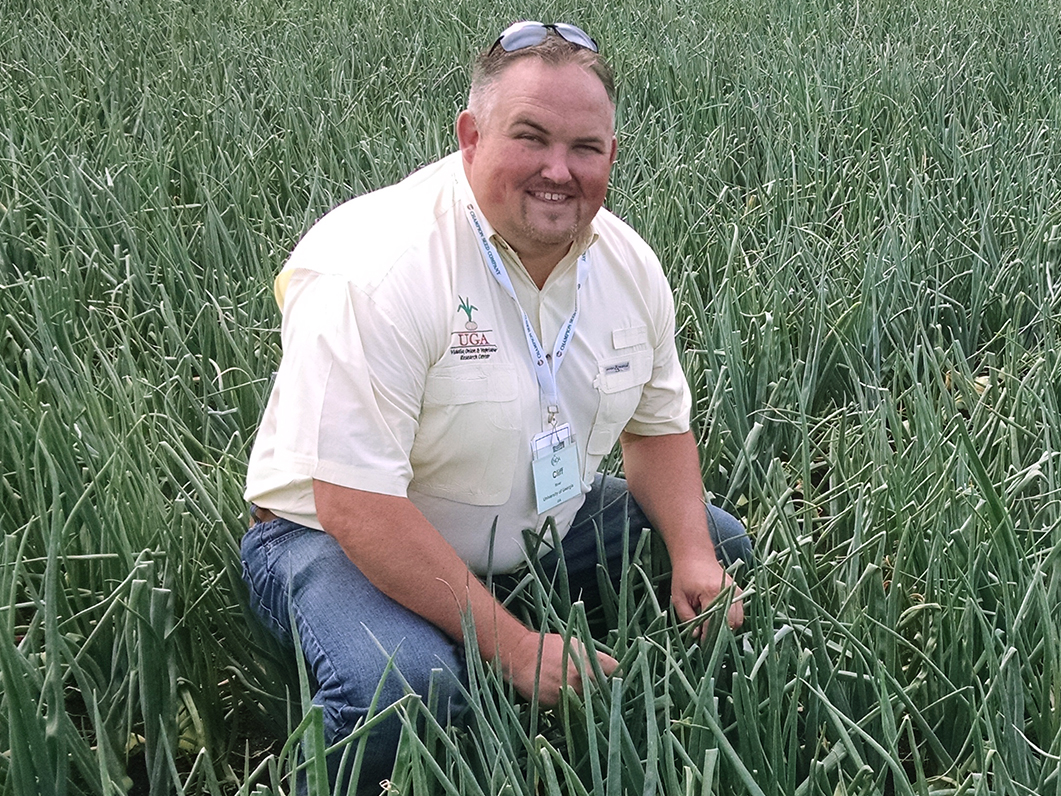When we finally caught up with Cliff Riner, Vidalia Onion and Vegetable Research Center coordinator and area onion agent with the University of Georgia Extension Service in Lyons, he was actually in South Texas, looking at onion breeder trials.
“Some seed companies want me to come here every three or so years,” he said.
It’s all part and parcel of the extension service position he’s held for 11 years, and Cliff said there’s nothing he’d rather be doing in terms of a career.
That he’s been on the job for more than a decade is testament to his dedication to onions, but that he’s 34 years old makes it even more impressive. Cliff Riner, Millennial.
“I don’t think of myself as a Millennial,” he emphasized to OnionBusiness.com. “I’m an agriculturalist at heart.” Cliff downplayed his age, and about his career and his position in the industry, he commented that “we’re lucky to have growers in the same age range” who with shared love of the land.
And while he’s from “the middle of the Vidalia growing region,” Cliff is also quick to point out he wasn’t born into the onion industry.
“I have lived on the Toombs and Tattnall County line my whole life besides the years of college, and these two counties grow about 90 percent of the Vidalia acreage,” he explained. He went on to say that although he grew up on a farm, “I am not from an onion family.”
Family members are mostly educators, but Cliff says he tells people that “onions chose me.” He said, “I wanted to study and work in agriculture, and I wanted to live close to my original home. My other opportunities were either in the forestry or poultry industry.”
Cliff continued, “Over the course of time, there were opportunities for me to learn more from some really good people in the onion industry. It was a case of being at the right place at the right time. The Lord has certainly blessed my career, because it surely didn’t have to happen the way it did.”
The college years he referred to include two years during which he earned an Associate of Science in Animal Science from Abraham Baldwin Agricultural College. “I also graduated with a Bachelors of Agriculture Education from the University of Georgia, and I am in the process of completing my Masters degree in Agriculture and Environmental Education from UGA,” he said.

From Left, Kylar, Cliff and Sandy Riner
Graduating from UGA in May 2006, Cliff hit the ground running with the Extension service. In 2008 he and his wife, Sandy, married, and their daughter Kylar turns four in May. “We also have a bulldog who’s like a child,” Cliff said.
To many it might seem like Cliff jumped into his job, and although he did start immediately after graduation, the position itself was one of evolution.
“I started Extension as a county agent right out of college, but while I was college, I had worked at the Onion Research Center during the summers and for all of the vegetable specialists during my school semesters. I gained a lot of experience with onions from my student work and internships, and today I would encourage any student to do internships to gain experience before graduating.”
As the Research Center coordinator and area onion agent, Cliff is responsible for the onion trials, which are carried out from November through May.
“Parts of the process go the entire year,” he said. “We analyze stuff out of the sheds too.”
This year’s Field Day is April 6, he said.
Vidalia onions are all yellow granex, but Cliff noted, “We always get the most attention from the variety trial, and this year’s trial contains 40 yellows, seven reds and one white. I will oversee this project, and I also am focused this year on plant population and planting date studies of some of the emerging varieties. I will also have a study that will analyze the flavor of the onions throughout the season. The study will be conducted with a UGA intern under my supervision.” And he said, “I have a number of partnership research plots with other scientists.”
The colored varieties are important, but of course it’s the namesake Vidalia that holds center court. We asked Cliff to explain what makes it special, and he said, “The soil is a major component, but it is the soil and the weather. We have a pocketed climate that really affects the temperature range in most years for a mild winter.”
That said, Cliff added, “However, the varieties we have now and what is in the breeding process will just raise the bar for higher quality. The fortunate thing about my job is to see how much change has and will take place, for the better.”
He told us researchers are “looking at later varieties that with heat resistance” as well as resistance to pests and disease. Storage capabilities are always being taken into consideration, too.
“I can remember before CA the Vidalia deal was pretty short, and thanks to technology it has been extended,” Cliff said. “I feel that demand has grown to a point that we must add more CA to keep a consistent product throughout the summer months. Our varieties are now better suited for storage, even more than when we first built the rooms. I also feel we have to mechanize parts of the process. I don’t know how that will look, but I know it will happen.”
The Vidalia deal is generally cleaned up by Labor Day, Cliff said, and this year the first loads will go out April 12, an early start.
“The fresh market goes until we fill up our stores,” he said. “That’s usually late May, depending on movement.” Most growers plant for retail, he added.
Asked what he wants to accomplish, Cliff Riner said he’s right where he wants to be, although he strives to be better at it all the time.
“I think my goal is to be a very successful Extension agent,” he said. “A lot of growers in my age range are successful, and we see the produce industry in general as exciting and challenging.”
Happy to share his knowledge, Cliff said, “I get a lot of satisfaction from the learning process in my job.”
[robo-gallery id=”5605″]


